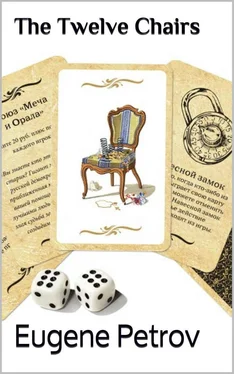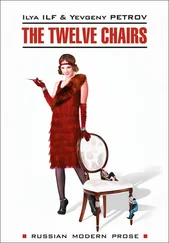Eugene Petrov - The Twelve Chairs
Здесь есть возможность читать онлайн «Eugene Petrov - The Twelve Chairs» весь текст электронной книги совершенно бесплатно (целиком полную версию без сокращений). В некоторых случаях можно слушать аудио, скачать через торрент в формате fb2 и присутствует краткое содержание. Год выпуска: 2013, Жанр: Юмористическая проза, на английском языке. Описание произведения, (предисловие) а так же отзывы посетителей доступны на портале библиотеки ЛибКат.
- Название:The Twelve Chairs
- Автор:
- Жанр:
- Год:2013
- ISBN:нет данных
- Рейтинг книги:5 / 5. Голосов: 1
-
Избранное:Добавить в избранное
- Отзывы:
-
Ваша оценка:
- 100
- 1
- 2
- 3
- 4
- 5
The Twelve Chairs: краткое содержание, описание и аннотация
Предлагаем к чтению аннотацию, описание, краткое содержание или предисловие (зависит от того, что написал сам автор книги «The Twelve Chairs»). Если вы не нашли необходимую информацию о книге — напишите в комментариях, мы постараемся отыскать её.
Find traces of a separate headset difficult and heroes face different adventures and troubles.
The Twelve Chairs — читать онлайн бесплатно полную книгу (весь текст) целиком
Ниже представлен текст книги, разбитый по страницам. Система сохранения места последней прочитанной страницы, позволяет с удобством читать онлайн бесплатно книгу «The Twelve Chairs», без необходимости каждый раз заново искать на чём Вы остановились. Поставьте закладку, и сможете в любой момент перейти на страницу, на которой закончили чтение.
Интервал:
Закладка:
the waistcoat, still warm from Vorobyaninov's body.
"No, I can't do things like that," said Ippolit Matveyevich, flushing.
"Please give it back."
Ostap's delicate nature was revulsed.
"There's stinginess for you," he cried. "We undertake business worth a
hundred and fifty thousand and you squabble over eight roubles! You want to
learn to live it up!"
Ippolit Matveyevich reddened still more, and taking a notebook from his
pocket, he wrote in neat handwriting:
25//F/27
Issued to Comrade Bender
Rs.8
Ostap took a look at the notebook.
"Oho! If you're going to open an account for me, then at least do it
properly. Enter the debit and credit. Under 'debit' don't forget to put down
the sixty thousand roubles you owe me, and under 'credit' put down the
waistcoat. The balance is in my favour-59,992 roubles. I can live a bit
longer."
Thereupon Ostap fell into a silent, childlike sleep. Ippolit
Matveyevich took off his woollen wristlets and his baronial boots, left on
his darned Jaegar underwear and crawled under the blanket, sniffling as he
went. He felt very uncomfortable. On the outside of the bed there was not
enough blanket, and it was cold. On the inside, he was warmed by the smooth
operator's body, vibrant with ideas.
All three had bad dreams.
Vorobyaninov had bad dreams about microbes, the criminal investigation
department, velvet shirts, and Bezenchuk the undertaker in a tuxedo, but
unshaven.
Ostap dreamed of: Fujiyama; the head of the Dairy Produce Co-operative;
and Taras Bulba selling picture postcards of the Dnieper.
And the caretaker dreamed that a horse escaped from the stable. He
looked for it all night in the dream and woke up in the morning worn-out and
gloomy, without having found it. For some time he stared in surprise at the
people sleeping in his bed.
Not understanding anything, he took his broom and went out into the
street to carry out his basic duties, which were to sweep up the horse
droppings and shout at the old-women pensioners.
CHAPTER SEVEN
TRACES OF THE TITANIC
Ippolit Matveyevich woke up as usual at half past seven, mumbled "Guten
Morgen", and went over to the wash-basin. He washed himself with enthusiasm,
cleared his throat, noisily rinsed his face, and shook his head to get rid
of the water which had run into his ears. He dried himself with
satisfaction, but on taking the towel away from his face, Ippolit
Matveyevich noticed that it was stained with the same black colour that he
had used to dye his horizontal moustache two days before. Ippolit
Matveyevich's heart sank. He rushed to get his pocket mirror. The mirror
reflected a large nose and the left-hand side of a moustache as green as the
grass in spring. He hurriedly shifted the mirror to the right. The
right-hand mustachio was the same revolting colour. Bending his head
slightly, as though trying to butt the mirror, the unhappy man perceived
that the jet black still reigned supreme in the centre of his square of
hair, but that the edges were bordered with the same green colour.
Ippolit Matveyevich's whole being emitted a groan so loud that Ostap
Bender opened his eyes.
"You're out of your mind!" exclaimed Bender, and immediately closed his
sleepy lids.
"Comrade Bender," whispered the victim of the Titanic imploringly.
Ostap woke up after a great deal of shaking and persuasion. He looked
closely at Ippolit Matveyevich and burst into a howl of laughter. Turning
away from the founder of the concession, the chief director of operations
and technical adviser rocked with laughter, seized hold of the top of the
bed, cried "Stop, you're killing me!" and again was convulsed with mirth.
"That's not nice of you, Comrade Bender," said Ippolit Matveyevich and
twitched his green moustache.
This gave new strength to the almost exhausted Ostap, and his hearty
laughter continued for ten minutes. Regaining his breath, he suddenly became
very serious.
"Why are you glaring at me like a soldier at a louse? Take a look at
yourself."
"But the chemist told me it would be jet black and wouldn't wash off,
with either hot water or cold water, soap or paraffin. It was contraband."
"Contraband? All contraband is made in Little Arnaut Street in Odessa.
Show me the bottle. . . . Look at this! Did you read this?" '-"Yes."
"What about this bit in small print? It clearly states that after
washing with hot or cold water, soap or paraffin, the hair should not be
rubbed with a towel, but dried in the sun or in front of a primus stove. Why
didn't you do so? What can you do now with that greenery? "
Ippolit Matveyevich was very depressed. Tikhon came in and seeing his
master with a green moustache, crossed himself and asked for money to have a
drink. "Give this hero of labour a rouble," suggested Ostap, "only kindly
don't charge it to me. It's a personal matter between you and your former
colleague. Wait a minute, Dad, don't go away! There's a little matter to
discuss."
Ostap had a talk with the caretaker about the furniture, and five
minutes later the concessionaires knew the whole story. The entire furniture
had been taken away to the housing division in 1919, with the exception of
one drawing-room chair that had first been in Tikhon's charge, but was later
taken from him by the assistant warden of the second social-security home.
"Is it here in the house then?"
"That's right."
"Tell me, old fellow," said Ippolit Matveyevich, his heart beating
fast, "when you had the chair, did you . . . ever repair it?"
"It didn't need repairing. Workmanship was good in those days. The
chair could last another thirty years."
"Right, off you go, old fellow. Here's another rouble and don't tell
anyone I'm here."
"I'll be a tomb, Citizen Vorobyaninov."
Sending the caretaker on his way with a cry of "Things are moving,"
Ostap Bender again turned to Ippolit Matveyevich's moustache.
"It will have to be dyed again. Give me some money and I'll go to the
chemist's. Your Titanic is no damn good, except for dogs. In the old days
they really had good dyes. A racing expert once told me an interesting
story. Are you interested in horse-racing? No? A pity; it's exciting. Well,
anyway . . . there was once a well-known trickster called Count Drutsky. He
lost five hundred thousand roubles on races. King of the losers! So when he
had nothing left except debts and was thinking about suicide, a shady
character gave him a wonderful piece of advice for fifty roubles. The count
went away and came back a year later with a three-year-old Orloff trotter.
From that moment on the count not only made up all his losses, but won three
hundred thousand on top. Broker-that was the name of the horse-had an
excellent pedigree and always came in first. He actually beat McMahon in the
Derby by a whole length. Terrific! . . . But then Kurochkin-heard of
him?-noticed that all the horses of the Orloff breed were losing their
coats, while Broker, the darling, stayed the same colour. There was an
unheard-of scandal. The count got three years. It turned out that Broker
wasn't an Orloff at all, but a crossbreed that had been dyed. Crossbreeds
are much more spirited than Orloffs and aren't allowed within yards of them!
Which? There's a dye for you! Not quite like your moustache!"
"But what about the pedigree? You said it was a good one."
"Just like the label on your bottle of Titanic-counterfeit! Give me the
Читать дальшеИнтервал:
Закладка:
Похожие книги на «The Twelve Chairs»
Представляем Вашему вниманию похожие книги на «The Twelve Chairs» списком для выбора. Мы отобрали схожую по названию и смыслу литературу в надежде предоставить читателям больше вариантов отыскать новые, интересные, ещё непрочитанные произведения.
Обсуждение, отзывы о книге «The Twelve Chairs» и просто собственные мнения читателей. Оставьте ваши комментарии, напишите, что Вы думаете о произведении, его смысле или главных героях. Укажите что конкретно понравилось, а что нет, и почему Вы так считаете.












